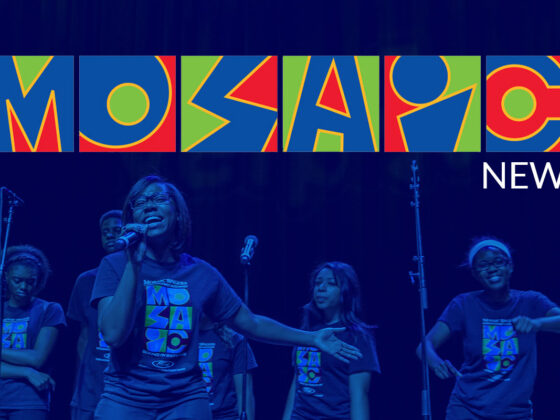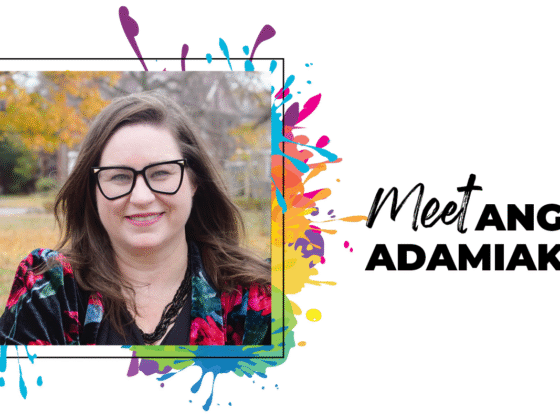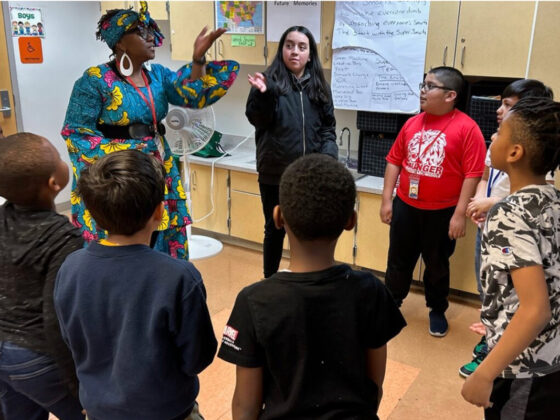Your pronouns
She/her/hers
Your current title/organization
Associate Vice President of Advancement, Heights Philadelphia
What brought you to Mosaic?
I started taking the adult-led Saturday performance workshops at the Walker Williams Rec Center when I was 12. This experience opened my eyes to the depth of Black art and the beauty of our ability to convey stories from the past. We even did a rhythmic performance of “Danse Africaines” by Langston Hughes. That fall, I auditioned for the acting company, but it was a tough experience—I didn’t even make it to the second round. However, that spring, my mom took me to see the first Crossing Eight Mile at the Music Hall. Watching young talents like Carollette Goodman and Diarra Kilpatrick command the stage inspired me. In that moment, I knew I could become the kind of artist who could one day own my own stage.
Can you share a specific moment or experience at Mosaic that has had a profound impact on you? What do you still carry with you?
One of my final performances with Mosaic was an international trip to Singapore and Malaysia for a short residency of Medea at LaSalle College of the Arts. It was a moment steeped in significance and such a pivotal time for so many reasons. I stood on distant shores, the farthest I had ever traveled, and, in many ways, I “left” of many things that had made up my whole world at Mosaic. It was the first time I allowed anyone other than Rick Sperling to direct me. It was the first fully adult character I ever played. It was my last show before college, and I was literally half a world away from everything that had shaped me. I let go of a lot of fear in that trip, and while I mourned some of the loss, I recognized that it was the right culmination of my time in a place that had broadened my horizons and prepared me for whatever lay ahead.
How have you seen the skills and knowledge you gained at Mosaic translate to your life to this point artistically, educationally, and professionally?
My time in Mosaic taught me the incredible superpower that is storytelling. The ability to not just see someone else perspective but to fully set aside your own worldview to embody someone else’s experience is a hard, hard thing. Yet, it is one of the most generous ways we can say to one another, “I see you, and your story has value.” When people entrust you with their truth, that’s a sacred confidence. And whether I was making small talk while bagging groceries at Trader Joe’s, teaching 3rd graders about imagery, or now, fostering a community of support for a bold vision of equity, I honor the profound responsibility I have to carry these stories. Each tale is a thread that weaves us together, and I am grateful for the trust placed in me to share them.
What was the biggest lesson you learned at Mosaic?
I’m usually not the main character in every situation I’m in. Even though I may feel like those around me must know how their actions are impacting my story, sometimes, I’m actually a background character and it’s my job not to pull focus but rather help to direct attention to someone else for a while.
Can you share a specific moment or experience at Mosaic that challenged you but ultimately helped you become a stronger artist or leader?
Tenth grade was a personally challenging year for me. I had to transfer schools midyear and navigate the social fallout that came with it. I was doing school tour shows of Everybody’s Talkin and was cast to play my former school as Hero, a character whose circumstances mirrored my own. Unlike the feelings of powerlessness I experienced, Hero’s fierce final monologue empowered me in ways I hadn’t realized I needed. I’m not sure if anyone in the audience noticed the parallels I felt so deeply, but through that performance, I was able to redeem my own story. That experience was crucial in helping me transition to the next phase of my life.
How did Mosaic prepare you for continuing education and what do you do now?
Well, first of all, Mosaic is probably why I’m a UMich alum. All those summers at the Performance Network sold me on my Ann Arbor home. I still carry a lot of what I learned about having a relationship with your audience. Being an actor, a teacher, a spokesperson, a mom- is all about negotiating a common story with someone else. I don’t get to decide for my audience, no matter who they are, what they will take from our time together just because I present something to them. But by trying to understand who I’m talking to, what they care about, how they move through the world, I may be able to invite them into a context that we can co-create together. This has been the most transferable lesson I’ve gotten from my early days in theater. That and, don’t assume they’re not listening just because they’re not clapping. Some applause is hard-won but worth it.
What, if anything, do you see as threads or links between youth development and entrepreneurship?
Young people are wellsprings of creativity and carry less fear than those of us with more experiences of failure.
Why are you a monthly donor?
Many supporters may be inspired by a single instance- a moment, a performance, a headline, and it’s great when those spikes in donations come in as a result. But I’ve worked in nonprofits for over a decade, and I know that sustaining a healthy organization requires dependable, consistent support. So many donors can get excited to support innovation or the next big project. And we need those donors for sure! But we also need those who will regularly toss in their coins to keep the lights on, buy the copy paper, pay the admin salaries, and all those little things that uphold the magic of Mosaic.
How do you connect the work you do now in the college success space with your desire and commitment to support the work Mosaic does?
Having all the responsibility of making decisions you’ll have to live with for decades but none of the experience to inform those decisions really sucks. Often, the adults surrounding young people forget this and place expectations on them that can feel overwhelming. But I’ve found that a lot of young people often just need a safe place to launch from. That comes in many forms. Joann Spencer picked me up in her minivan and drove me down to the Fort Wayne Historic Building for half of my high school years. She and Steven let me squat in their not-so-empty-nested home for years when I couldn’t find a job after college graduation. They believed that if I had the resources, I could navigate my decisions with greater agency, rather than operating from a place of scarcity. This understanding has shaped my approach to education. Too many young people are left to figure out how to be the first in their family to attend college or to navigate the uncertainties of early careers all on their own. I have committed my work and my life to becoming a safe launchpad for as many young people as possible, helping them find their way in a world that can often feel unforgiving.




